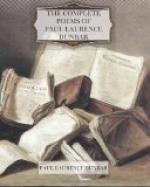Yet it appeared to me then, and it appears to me now, that there is a precious difference of temperament between the races which it would be a great pity ever to lose, and that this is best preserved and most charmingly suggested by Mr. Dunbar in those pieces of his where he studies the moods and traits of his race in its own accent of our English. We call such pieces dialect pieces for want of some closer phrase, but they are really not dialect so much as delightful personal attempts and failures for the written and spoken language. In nothing is his essentially refined and delicate art so well shown as in these pieces, which, as I ventured to say, described the range between appetite and emotion, with certain lifts far beyond and above it, which is the range of the race. He reveals in these a finely ironical perception of the negro’s limitations, with a tenderness for them which I think so very rare as to be almost quite new. I should say, perhaps, that it was this humorous quality which Mr. Dunbar had added to our literature, and it would be this which would most distinguish him, now and hereafter. It is something that one feels in nearly all the dialect pieces; and I hope that in the present collection he has kept all of these in his earlier volume, and added others to them. But the contents of this book are wholly of his own choosing, and I do not know how much or little he may have preferred the poems in literary English. Some of these I thought very good, and even more than very good, but not distinctively his contribution to the body of American poetry. What I mean is that several people might have written them; but I do not know any one else at present who could quite have written the dialect pieces. These are divinations and reports of what passes in the hearts and minds of a lowly people whose poetry had hitherto been inarticulately expressed in music, but now finds, for the first time in our tongue, literary interpretation of a very artistic completeness.
I say the event is interesting, but how important it shall be can be determined only by Mr. Dunbar’s future performance. I cannot undertake to prophesy concerning this; but if he should do nothing more than he has done, I should feel that he had made the strongest claim for the negro in English literature that the negro has yet made. He has at least produced something that, however we may critically disagree about it, we cannot well refuse to enjoy; in more than one piece he has produced a work of art.




